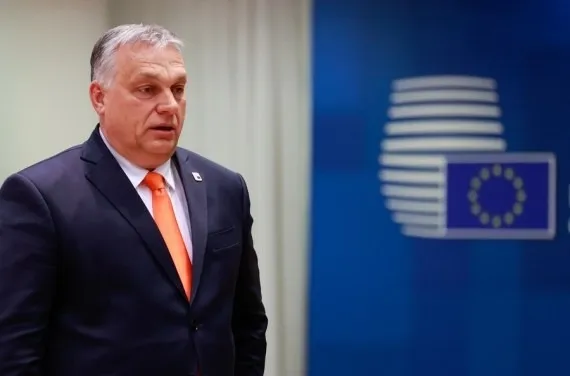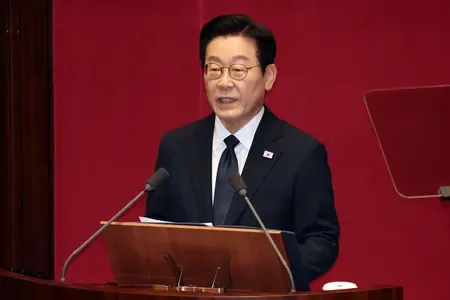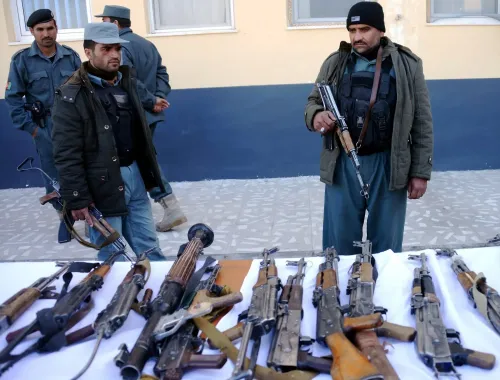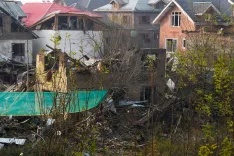Is Hungary Taking a Stand Against the EU's Ban on Russian Energy Imports?

Synopsis
Key Takeaways
- Hungary plans to challenge the EU's energy import ban.
- Orban claims the EU's approach violates European law.
- Hungary's economy heavily relies on Russian energy.
- US sanctions exemptions were secured for Russian energy firms.
- The EU has imposed extensive sanctions on Russia since 2022.
Budapest, Nov 14 (NationPress) Hungary's Prime Minister Viktor Orban declared on Friday that his nation intends to contest the European Union's initiative to eliminate Russian energy imports in the EU court.
While speaking on state radio, Orban accused the EU of trying to bypass his veto authority over sanctions on Russian energy by employing trade regulations in its strategy to terminate all imports of Russian oil and gas by the conclusion of 2027, labeling it a "serious breach of European law."
"We are appealing to the European Court of Justice regarding this issue," he stated, as reported by Euro News.
"This act blatantly undermines European law, the rule of law, and European collaboration... They will incur a significant cost for this," Orban emphasized.
Hungary, which is landlocked, is heavily dependent on Russian energy and has sought exemptions while threatening to veto the sanctions imposed by the bloc following the onset of the conflict between Russia and Ukraine in 2022.
During his recent visit to the US, Orban obtained an exemption from US sanctions on two Russian energy firms after a meeting with President Donald Trump at the White House.
"We requested the president to remove the sanctions. We reached an agreement, and the President confirmed that these sanctions would not apply to the two pipelines," he mentioned.
Orban attributed his strong rapport with Trump as pivotal for securing the exemption, which he asserted would remain effective as long as both he and the US President hold office. He described Russian energy as "essential" for Hungary, warning that cutting off supplies could lead to economic disaster.
He also indicated that he is "exploring other non-legal avenues" to evade the EU's plan to halt Russian energy imports, as reported by Euro News.
US Secretary of State Marco Rubio noted that the exemption allowing Hungary to procure Russian oil and gas would be valid for one year.
Earlier in October, the EU Council approved its 19th package of sanctions against Russia due to its military actions in Ukraine, which began in 2022. These sanctions target Russian energy, financial institutions, cryptocurrency exchanges, and various entities in China.
The European Union Council stated: "Today's package imposes a ban on imports of Russian liquefied natural gas (LNG) into the EU, commencing in January 2027 for long-term contracts and within six months for short-term contracts, while also tightening existing transaction bans on significant Russian state-owned oil producers (Rosneft and Gazprom Neft). The EU is also sanctioning a Tatarstani conglomerate involved in the Russian oil sector. Concurrently, measures are being taken against critical third-country operators supporting Russia's revenue streams, including sanctions against Chinese entities - two refineries and an oil trader - that are major buyers of Russian crude oil."
Furthermore, the EU declared additional sanctions across the shadow fleet value chain. The 19th package features the inclusion of Litasco Middle East DMCC, a key player in facilitating Lukoil’s shadow fleet based in the UAE. Other listings encompass maritime registries offering false flags to shadow fleet vessels, enabling their ongoing operation while falsely suggesting compliance with certification standards.
The sanctions have also targeted the largest port container operator in the Russian Far East and a prominent shipbuilder for Sovcomflot. An additional 117 vessels are now subject to a port access ban, along with restrictions on various services related to maritime transport, raising the total number of designated vessels to 557. These measures specifically target non-EU tankers associated with the shadow fleet that evade the oil price cap mechanism, which supports Russia's energy sector or transports military equipment for Russia or plundered Ukrainian grain.









